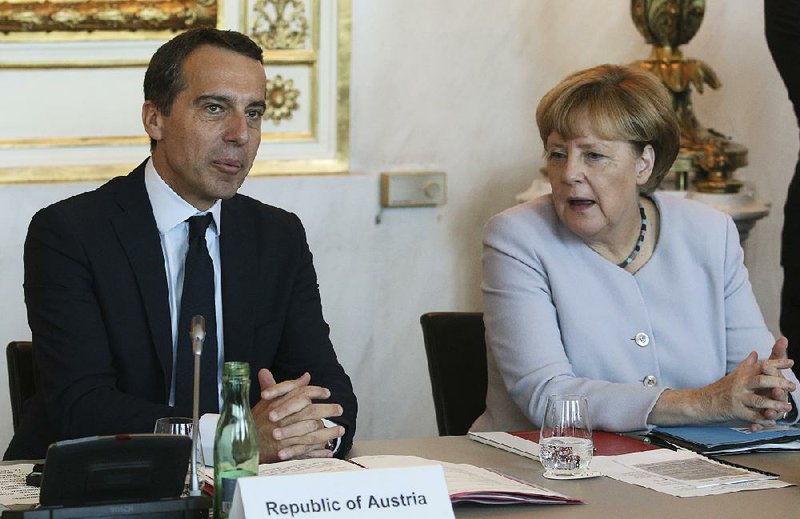VIENNA -- Austria's chancellor vowed Saturday to better protect the European Union's outer borders to curb illegal migration, as he held a summit with his German, Greek and west Balkans counterparts to discuss strategies to deal with Europe's migrant crisis.
"We need to regain control over our external border," Chancellor Christian Kern said at a news conference after the Vienna summit. "We need to decide who gets to come to Europe," not the traffickers, he said.
German Chancellor Angela Merkel said a speedier return of migrants who didn't get asylum status is an important goal.
She said the officials discussed the necessity of quickly completing agreements with African countries as well as with Pakistan and Afghanistan, "so that those who cannot stay for humanitarian reasons will be returned to their home countries."
Both Merkel and Kern stressed that the migrant situation in Europe was better than a year ago, when thousands crossed the Mediterranean Sea each day from Turkey to Greece, then trekked up the Balkans to northern Europe. About 1 million migrants entered Europe last year, the majority from Syria, Iraq, Afghanistan and other crisis-torn countries.
"You will never be able to close a border completely, but for Germany it's been too much, and I understand the concern," Kern said. To alleviate pressure created by North African migrants, Kern said he wants to strike financial deals with Niger, Mali, Egypt and Senegal along the lines of the agreement the EU has with Turkey.
"We have a successful model with Turkey, and this is the model on which we want to build," Kern said. Under its agreement, Turkey has helped slow the flow of migrants and refugees in return for economic aid and talks to extend visa privileges.
The closing of the Balkans migration route in the spring and the EU-Turkey agreement in March have led to a dramatic reduction of the number of people reaching northern Europe.
Still, leaders pointed out that they were considering strengthening the EU's border agency, Frontex, not only along the continent's sea borders, but also to help protect inner European borders, for example at the border between Greece and Macedonia.
Kern said legislation may be drafted to let military forces assist in some cases.
"We need to make sure, practically and politically, that the west Balkans route will remain closed to illegal migration for good," EU Council President Donald Tusk said.
The influx of foreigners triggered a backlash in European countries. Migration was a key factor in the U.K. vote to leave the 28-nation bloc. Nationalist politicians promising to crack down on migrants have won support in Austria and Germany. And eastern EU members are opposed to accepting any migrants, including refugees, splitting with western nations that are in favor of adhering to legal conventions.
Also Saturday, French President Francois Hollande confirmed plans to close the Calais migrant camp known as "the Jungle," saying he hopes authorities can relocate as many as 9,000 migrants to reception centers across France in the coming weeks.
Hollande, who was in the central city of Tours to visit one of France's 164 migrant reception centers, said conditions in the Calais camp are "not acceptable" and "extremely difficult," especially for those who fled war to get there.
Hollande, who is to visit Calais on Monday, insisted that "we cannot have such camps in France." He said his country must show it is "capable of being dignified, humane and responsible."
The reception centers will hold 40-50 people for up to four months while authorities study their cases, he said. Migrants who don't seek asylum will be deported.
Half of the Calais camp was dismantled in March, but its population has since doubled. Hollande's government has promised to dismantle the Calais camp by the end of the year but has not given a firm timeline.
The plan to relocate the migrants to towns across France has prompted protests from many politicians on the local level, saying they fear the consequences of having migrants in their towns.
Information for this article was contributed by Kiyoko Metzler, Kirsten Grieshaber and staff members of The Associated Press; and by Jonathan Tirone and Arne Delfs of Bloomberg News.
A Section on 09/25/2016

